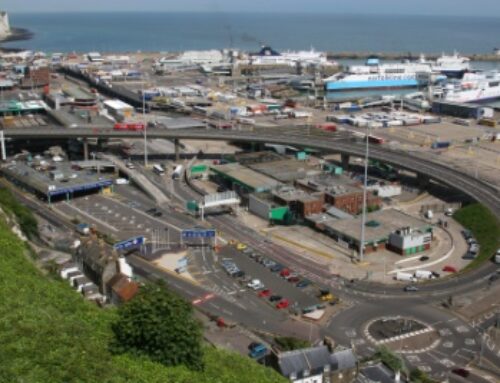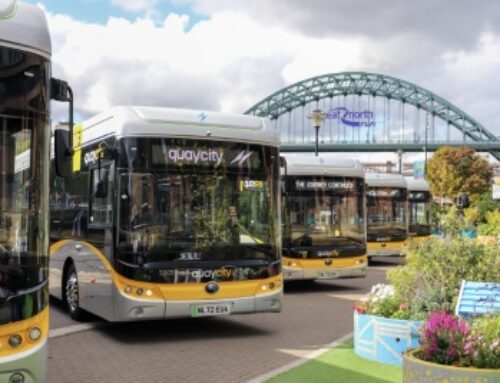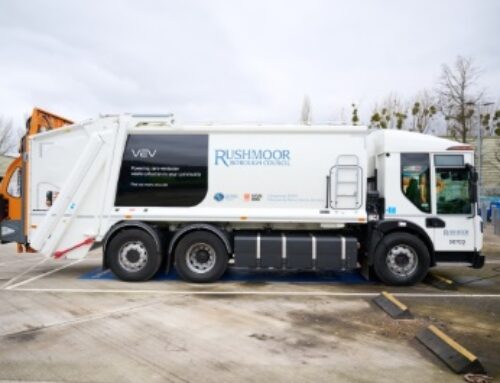Brexit: ‘apply for ECMT permits now’, says RHA
 International hauliers wishing to apply for ECMT (European Conference of Ministers of Transport) permits – which will likely be required to transport goods to the EU and European Economic Area (EEA) after 29 March in the event of a no-deal Brexit – have just one week left in which to submit their applications.
International hauliers wishing to apply for ECMT (European Conference of Ministers of Transport) permits – which will likely be required to transport goods to the EU and European Economic Area (EEA) after 29 March in the event of a no-deal Brexit – have just one week left in which to submit their applications.
The submissions process will close on Friday 21 December, and operators registered with the Vehicle Operator Licensing online system can apply at any time before 11:59pm on that date.
Permits are not allocated on a first-come, first-served basis, so operators can apply at any time prior to the deadline, said the Driver & Vehicle Standards Agency (DVSA) – which is managing the scheme – in a reminder issued to fleet operators last week.
Permits will then be allocated in early 2019, according to the allocation process laid down by the government.
“The deal recently negotiated by the UK government provides a framework for continued open transport access between the UK and EU for both businesses and consumers,” said DVSA.
“We do not want or expect a no deal scenario. It is however the duty of a responsible government to continue to prepare for a range of potential outcomes including the unlikely event of no deal.
“So you can prepare contingency plans for the unlikely event of a ‘no deal’, you can apply for an ECMT permit to continue operating in the EU after 29 March 2019.”
The Road Haulage Association (RHA) earlier this week advised international operators “to apply for ECMT permits now”, following the government’s cancellation of the so-called “meaningful vote” on Theresa May’s EU withdrawal agreement when it became clear it would not be passed by Parliament.
“It’s recommended that applications are only made where they’re needed,” said the RHA.
“Given the massive shortfall of permits, it is likely that trying to beat the system by making more applications than needed will be ineffective and costly.
“Those planning to upgrade their vehicles to Euro 6 by March 2019 are also advised by DfT to apply for permits.”
The government has so far been advising that it expects Northern Ireland-based operators transporting goods into the Republic of Ireland after Brexit not to require ECMT permits.
“Regulations were passed through Parliament in November 2018 which confirm that the UK government does not require Northern Ireland hauliers to carry permits when on international journeys to, or through Ireland,” the Department for Transport says in advice currently available on its website.
“This is in keeping with our position in the Road Haulage and Trailer Registration Act that we will not introduce permits on the island of Ireland without the consent of the Government of Ireland.
“Operators with a Northern Ireland operator’s licence will not be required to obtain an ECMT permit for a journey to the Republic of Ireland.”
However, it added: “Operators with a Great Britain operator’s licence should apply for an ECMT permit if they plan to drive in the Republic of Ireland from 29 March 2019.”
The “meaningful vote” in Parliament will now be postponed until the New Year, but the government has pledged that it will take place by 21 January. In the meantime, the prime minister is hoping to secure further EU concessions on the controversial Northern Ireland ‘backstop’ arrangement, which is designed to safeguard against the danger of a hard border with the ROI – but which many MPs fear could leave the UK tied to EU customs regulations in perpetuity.
On Wednesday, Conservative backbench MPs attempted to oust Mrs May as Tory leader and trigger a contest for a replacement, but around two thirds of her MPs voted for her to remain, arguably strengthening the prime minister’s position in the short term.
This changes little as regards the prospects of a Brexit deal, however; as a majority of parliamentarians appear to remain staunchly opposed to the deal on the table unless further concessions can be won from Europe.
EU leaders have been clear that they do not intend to reopen negotiations on the withdrawal deal itself, but have said they are open to providing clarifications or assurances which may help sceptical British MPs to swallow the backstop aspect of the agreement.
Earlier this week James Hookham, deputy CEO of FTA, said: “What industry needs now, with a little over 100 days to go until the UK leaves the EU, is certainty and direction on the ways in which we will be trading after 29 March 2019.
“Logistics and supply chain managers are used to fast-changing situations, but it is now critical that answers are provided to key questions about Britain’s future trading relationship with the EU.
“Business cannot be left bearing the consequences and costs of political hesitation.”
Following a meeting with the transport secretary Chris Grayling in Downing Street last week, RHA chief executive Richard Burnett said Mrs May’s withdrawal agreement would “keep the supply chain moving” for hauliers – whereas rejecting it without an alternative transitional period would see the industry “stagger towards a cliff-edge disaster”.
Mr Burnett said that the transition period integral to the prime minister’s deal would provide a chance for efficient new border technology and systems to be put in place, thereby avoiding “disastrous” queues at ports and a hard border on the island of Ireland.
“A deal will avoid reliance on an acute shortage of permits and measures for customs that are unworkable and impractical,” he said.
“The RHA has never taken a political view on Brexit. but the RHA’s board of directors feel parliamentary approval for a deal that includes a transition period is essential to avoid crippling the supply chain. The RHA believes any outcome delivered by Parliament that fails to deliver this is irresponsible.”
He also called on ministers to make changes to immigration rules after Brexit, to help the haulage industry to fill vacancies for drivers and other roles in the midst of an exodus of current EU workers.
“We continue to argue with government for future immigration rules that do not to exclude lorry drivers from the definition of skilled workers, so the bar is not set too high and excludes these vital, skilled and trained workers from jobs in the UK,” he said.
“It is essential that lower-paid skilled workers are still allowed to fill vacancies where there is a need for qualified staff in the UK.”
A major policy paper on the government’s planned post-Brexit immigration system, which may help clarify the impact on driver recruitment, will be published before the end of the month.
Announcing the move, leader of the House of Commons Andrea Leadsom said: “It is vital that we have an immigration system going forward that is fair to businesses that need to attract employees from overseas, but also fair to those people in the UK who voted for the UK Parliament to be able to control our borders.”











